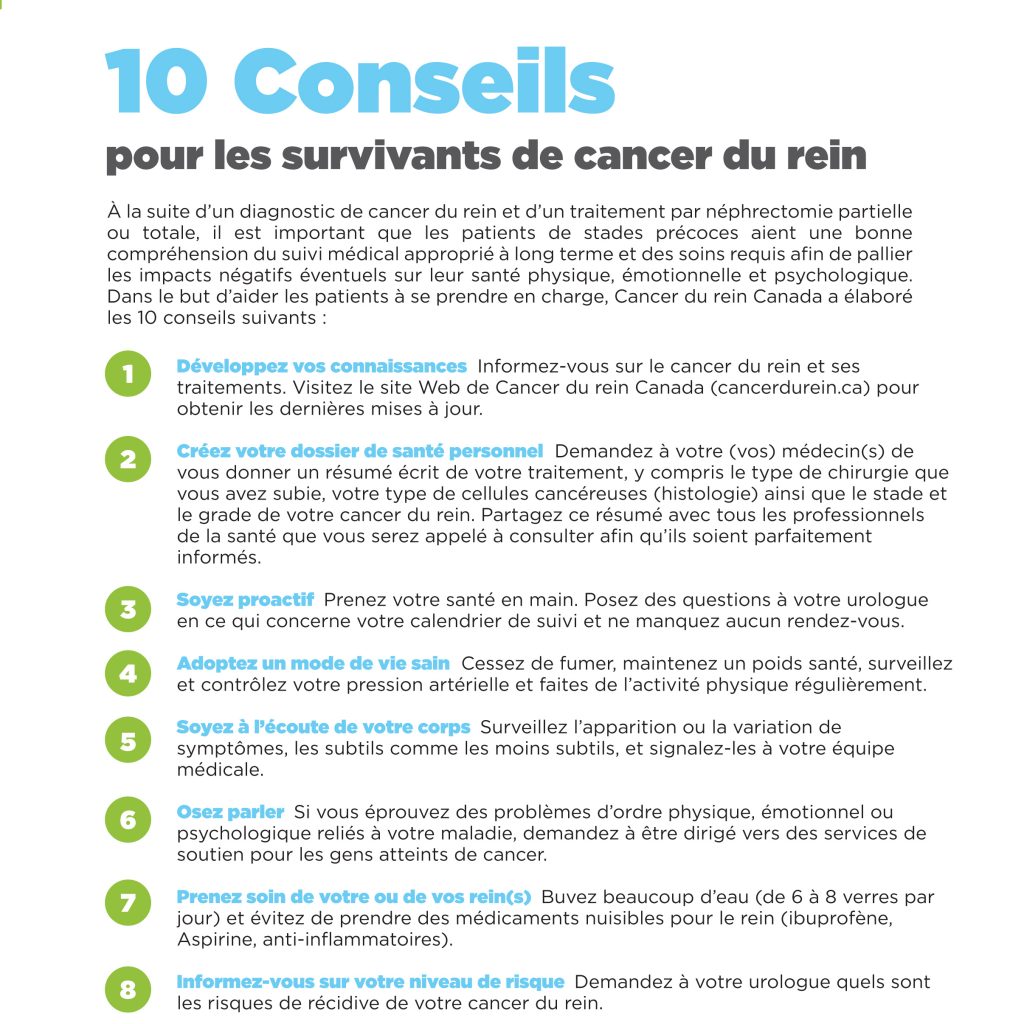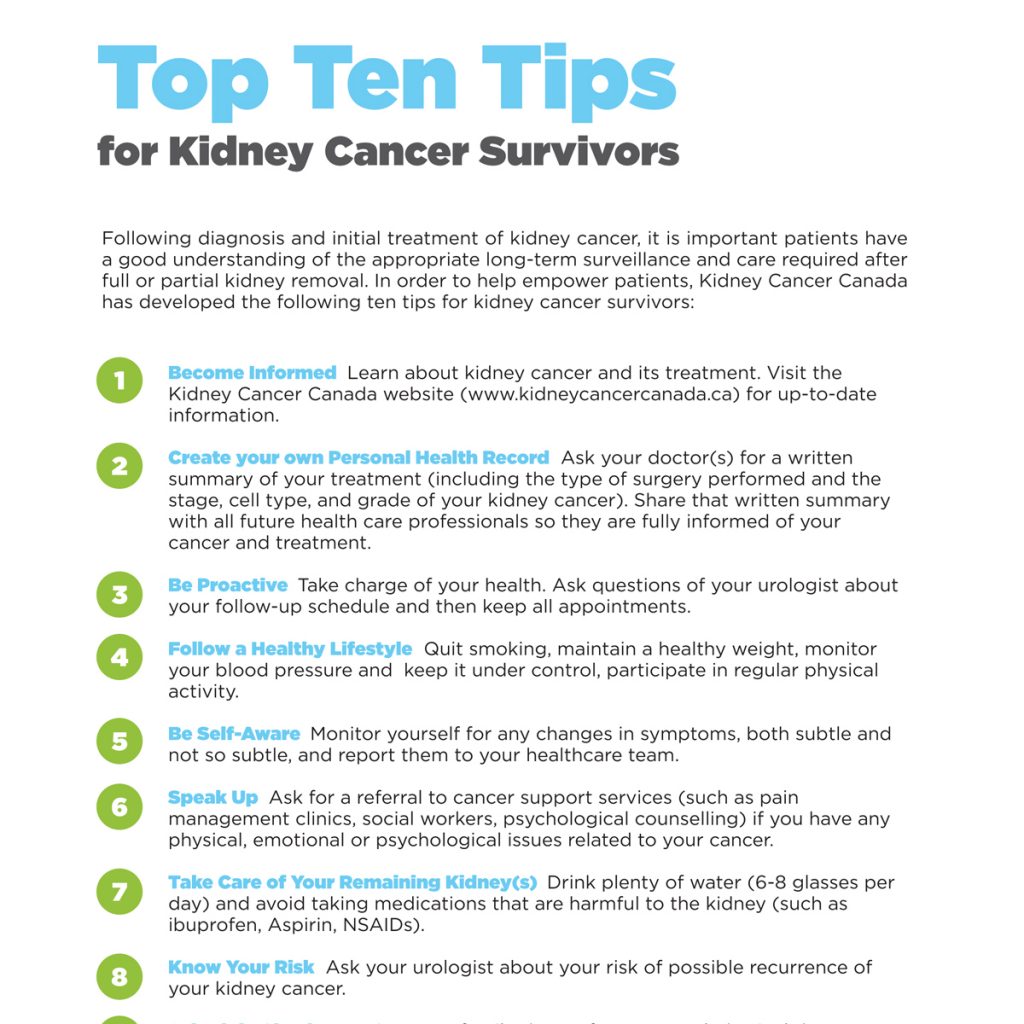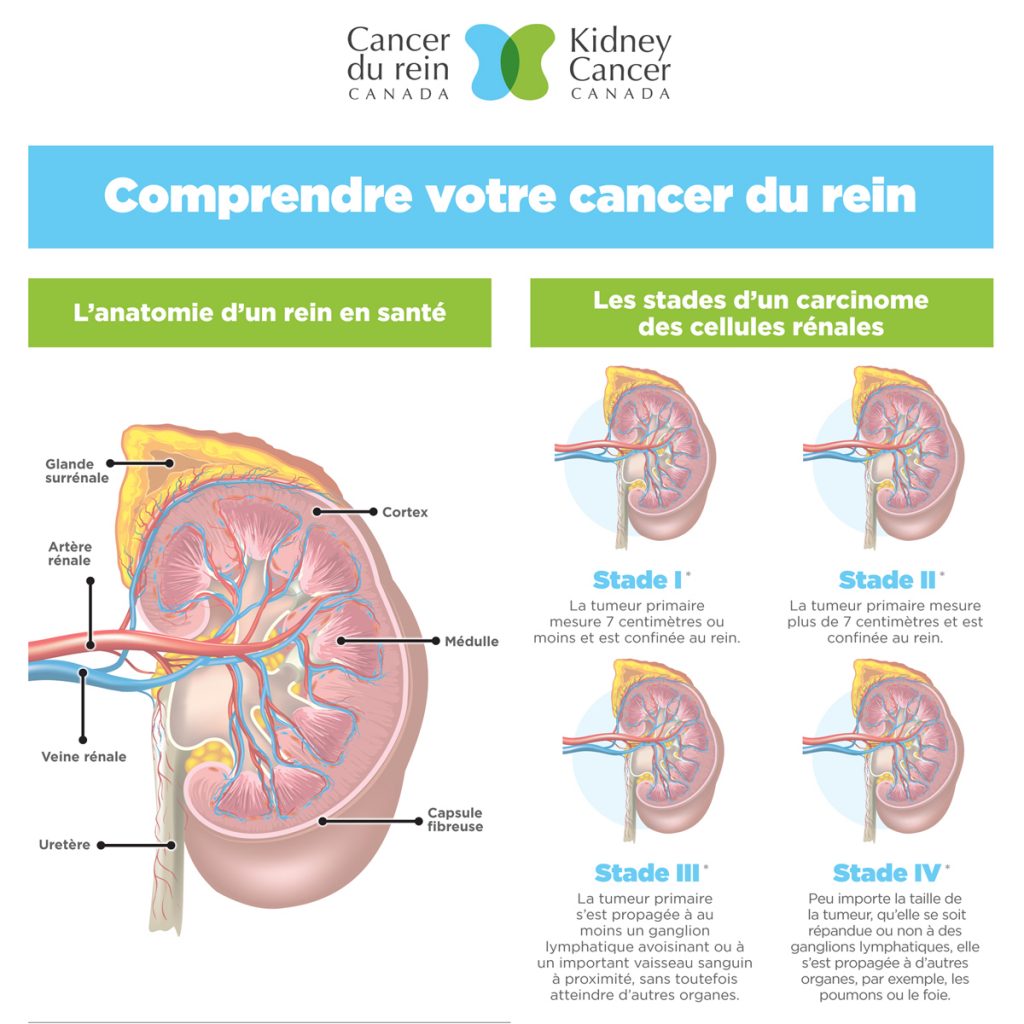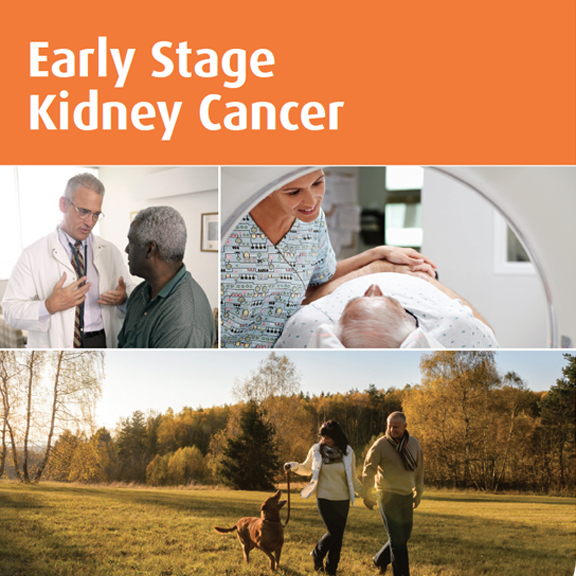
Summary of Kidney Cancer Highlights from ASCO 2025
Source: International Kidney Cancer Coalition (IKCC)
This year’s American Society of Clinical Oncology (ASCO) Annual Meeting was held from 30 May to 3 June 2025, in Chicago, USA. The presentations are available to view on the ASCO website. Some affiliates of the International Kidney Cancer Coalition (IKCC) went to the meeting to keep up to date with the care and treatment of patients with kidney cancer. A brief “Take home messages” section is followed by more in-depth review of selected abstracts.
Please note: The following summary was prepared for the benefit of patient advocates and patient organisations around the world who focus on kidney cancer. While this summary has been medically reviewed, the information contained herein is based upon public data shared at this meeting and is not intended to be exhaustive or act as medical advice. Patients should speak to their doctor about their own care and treatment.
Take home messages
- Abstract 4514 presented 5 -year follow-up results from the phase 3 KEYNOTE-564 study of adjuvant pembrolizumab. These results further support the use of 1 year adjuvant pembrolizumab as a standard treatment for patients with kidney cancer at high-risk of returning after surgery.
- Abstract e16520 presented an early study with a new immunotherapy for kidney cancer. The initial data from this study show that toripalimab is a promising adjuvant treatment for patients with kidney cancer that is at high risk of recurrence or progression.
- Abstract 4541 reported on a study of neoadjuvant combination treatment for kidney cancer. This study shows promising safety and effectiveness of neoadjuvant low dose lenvatinib plus pembrolizumab in patients with high-risk kidney cancer.
- Abstract 4506 presents the results of a study with a new HIF-2α. Casdatifan was well tolerated and showed promising anti-cancer effectiveness in patients with advanced clear cell kidney cancer who had already been treated with anti-cancer medication. Importance: The data from this study support the continued testing of casdatifan in an ongoing phase 3 study.
- In abstract 4515, a new VEGFR TKI called zanzalintinib in combination with nivolumab was shown to be well tolerated with a low rate of hand and foot syndrome in patients with untreated advanced/metastatic clear cell kidney cancer. Importance: The combination of zanzalintinib plus nivolumab shows promising anti-cancer activity in patients with untreated advanced/metastatic clear cell kidney cancer. Adding a third drug (relatlimab) did not provide extra benefit.
- Abstract 4508 presents early results from one of the first CAR T cell therapy studies for kidney cancer. After an average follow-up of 7 months, CAR T cell therapy showed promising anti-tumour activity. Importance: Further clinical research is ongoing to evaluate CAR T cell therapy in patients with advanced clear cell kidney cancer.
- In abstract 4529, the results from the first study of a product containing the bacterium Akkermansia were presented. The addition of Oncobax-AK to ipilimumab plus nivolumab appears to be safe and may regulate the bacteria in the gut microbiome, inflammation, metabolites and the immune cells of patients with intermediate- or poor-risk kidney cancer. Importance: This may lead to survival benefits in some patients. The study is continuing with more patients to find out how Oncobax-AK improves clinical outcomes.
- Abstract 4505 provides an update on the results of an important study of combination treatments: CheckMate-214 provides the longest reported follow-up data from any immunotherapy combination treatment (9 years follow-up data from ipilimumab plus nivolumab). Importance: The ipilimumab plus nivolumab combination resulted in long-term survival and response to treatment compared to sunitinib in all patients with untreated advanced or metastatic kidney cancer, supporting the use of this combination as standard care.
- Abstract 4540 provides an update on the results of another important combination study: TiNivo looked at the effectiveness of second-line tivozanib or tivozanib plus nivolumab after immunotherapy combinations and VEGFR-TKI plus immunotherapy combinations. Importance: There was no benefit from the addition of nivolumab to tivozanib in the second line.
- Abstract 4522 suggests that ipilimumab plus nivolumab may be more effective than the standard care for non-clear cell kidney cancer patients. Importance: A key criticism of this study is that the standard care treatments are outdated, and newer combination treatments with immune and targeted therapies may be better than ipilimumab plus nivolumab. More data on these rare cancers are needed, requiring international studies for sufficient patient numbers.
- Abstracts 4524 and e16508 reported on the safety and effectiveness of two new radio-labelled products 68Ga-NY104 and 68Ga-NYM005 to improve the sensitivity of PET/CT scans to detect and diagnose malignant tumours in the kidney and kidney cancer metastases. Importance: Both products show promise as patient-friendly, effective imaging agents for the diagnosis, staging and follow-up of clear cell kidney cancer patients.
- Abstract 411b describes a study with a new radioactive treatment for untreated metastatic kidney cancer, 177Lu girentuximab used in combination with nivolumab. Girentuximab is an antibody that is used to deliver radioactive lutetium (177Lu) directly to the cancer cells. This study hopes to show that damage to the tumour cell DNA caused by 177Lu girentuximab will activate the T cells of the immune system to attack the cancer cells. Importance: The study is already recruiting patients at sites in New York and New Jersey, USA.
- The study presented in abstract e16539 showed that checking for certain immune cells in tumours before treatment could help predict how well patients will respond to immunotherapy. More research is needed to confirm this idea for regular medical use.
- Abstract 4509 presented exploratory results from the NEOAVAX study of neoadjuvant avelumab plus axitinib. Patients who had prolonged disease-free survival following neoadjuvant treatment with avelumab plus axitinib had evidence of downsizing, pathologic response and immune cell infiltrates in their tumour tissue. However, most patients did not have a change in the immune cells in their tumours nor a pathologic response. Importance: This study is suggesting that responders to neoadjuvant therapy may be identified by a combination of clinicopathological response and immune cells in the tumour microenvironment. This single arm phase 2 study is not changing clinical practise but the concept warrants further investigation.
- Abstract 4510 presented new results from IMmotion010 looking at the genes in kidney cancer tumours that progressed after adjuvant atezolizumab. Importance: These results showed that there were changes in the genes that may offer insights into why some patients relapse after adjuvant treatment, but KIM-1 remains the best predictor of treatment outcomes with adjuvant atezolizumab.
- Abstract 4512 showed that higher blood levels of a protein called MAdCAM-1 were associated with improved outcomes to first-line treatments for metastatic kidney cancer. Importance: MAdCAM-1 is a promising prognostic biomarker for immunotherapy in patients with metastatic kidney cancer. Further international work is ongoing to look into these findings.
Summaries
Treatment given before or after surgery for high-risk kidney cancer
abstract 4514
Five-year follow-up after adjuvant pembrolizumab
Surgery (nephrectomy) is the standard of care for large, high-risk kidney cancers that have not spread outside the kidney. The cancer can come back (recurrence) after nephrectomy in some patients. Adjuvant therapy is additional treatment that is taken after surgery to reduce the risk of the cancer from coming back. Trials with vascular endothelial growth factor receptor (VEGFR) tyrosine kinase inhibitors (TKIs) that block the blood supply to the cancer have shown little benefit for patients for stopping the cancer from coming back after surgery. However, immunotherapy with pembrolizumab has been approved in several countries as an adjuvant therapy to stop the cancer from coming back in other parts of the body.
In the KEYNOTE-564 study, pembrolizumab (given by an infusion into a vein every 3 weeks for a year) has been shown to improve cancer-free survival after nephrectomy for kidney cancer patients at high-risk of their cancer returning compared to a dummy infusion (placebo). At ASCO 2025, more than 5 years of follow-up data from the KEYNOTE-564 trial were presented.
994 patients were enrolled in the trial, of which nearly three quarters had intermediate-risk disease and one fifth had high-risk disease. The remaining patients (6%) had metastases that had been removed, and they were cancer-free. Patients were followed up for more than 5 years and 10 months (70 months). All patients had stopped treatment with pembrolizumab for 3 or more years. The average disease-free survival time was not reached during the follow-up period for the group of patients treated with adjuvant pembrolizumab. For the placebo group, disease-free survival time was 5 years and 8 months. Average overall survival time was not reached for both groups of patients. However, more patients survived for 5 years or more when taking pembrolizumab (88%) compared to placebo (82%).
The cancer-free survival benefit with pembrolizumab continued during the 5 years and 10 months of follow-up: Adjuvant pembrolizumab improves cancer-free survival in all patients with high-risk kidney cancer compared with placebo. There were no new treatment-related side effects reported for 3 or more years.
These results further support the use of adjuvant pembrolizumab as a standard treatment for patients with kidney cancer at high-risk of returning after surgery.
Patients should carefully evaluate their situation in consultation with their doctor and discuss the potential risks and benefits of adjuvant pembrolizumab. In the absence of a predictive test, it is possible that some patients may receive treatment unnecessarily and experience serious side effects as a result. It is important for this consideration to be thoroughly discussed with a healthcare professional.
abstract e16520
Promising new adjuvant treatment for high-risk kidney cancer
An alternative immunotherapy, known as toripalimab, has been evaluated in a phase 2 study as an adjuvant treatment following surgery for high-risk kidney cancer. This abstract examines the safety and effectiveness of toripalimab in these patients. In the study, 38 patients who had a partial or radical nephrectomy were given toripalimab infusion every 3 weeks for a year. All patients were alive and disease-free 2 years after the start of adjuvant toripalimab. Only one patient had progression of their cancer just over 2 years (25 months) after the start of the study. Toripalimab was well tolerated, with only 2 patients reporting a severe or life-threatening side effect leading to them having to stop treatment. Quality of life was not affected by treatment.
The initial data from this study show that toripalimab is a promising adjuvant treatment for patients with kidney cancer that is at high risk of recurrence or progression.
abstract 4541
Neoadjuvant lenvatinib plus pembrolizumab shows promise for high-risk kidney cancer
Sometimes, anti-cancer medication is given before surgery to shrink the kidney tumour to make it easier to remove. This is called neoadjuvant treatment. The combination of lenvatinib plus pembrolizumab has been shown to improve the survival of patients with advanced, clear cell kidney cancer compared to standard of care with sunitinib. The PELUR study assessed the safety and effectiveness of a low dose of neoadjuvant lenvatinib plus pembrolizumab in patients with high-risk kidney cancer.
23 patients were treated with low dose neoadjuvant lenvatinib plus pembrolizumab before having surgery. The treatment was well tolerated, and patients reported a good quality of life. In all patients, the tumour and blood clot (thrombus) regressed, and nearly half of the patients had a partial response to treatment. After nearly 2 years follow-up, 5 patients had progression of their cancer, and 2 patients sadly died.
This study shows promising safety and effectiveness of neoadjuvant low dose lenvatinib plus pembrolizumab in patients with high-risk kidney cancer.
Potential new treatments for advanced kidney cancer
Currently, the most effective first-line treatment for patients with advanced kidney cancer is a combination of immunotherapy and VEGFR TKI (e.g., nivolumab plus cabozantinib) or a combination of immunotherapies (e.g., nivolumab plus ipilimumab). These combination therapies have significantly improved patient outcomes.
Some patients have a complete response to these treatments, characterised by the total regression of all metastases. For instance, approximately 9% of patients treated with nivolumab plus cabozantinib experience complete response. Ongoing research is focused on identifying new treatments that can increase complete tumour response.
abstract 4506
A new HIF-2α inhibitor in combination with a VEGFR-TKI shows promising anti-tumour activity in kidney cancer
Studies looking at the genes of people with kidney cancer have shown mutations in a gene called the von Hippel-Lindau (VHL) gene. This results in high levels of a protein called hypoxia-inducible factor, or HIF-2α in tumour cells. HIF-2α causes changes in the cancer cells resulting in the growth of the tumour. A new treatment, called a HIF-2α inhibitor, is a tablet that blocks the action of HIF-2α and tumour growth. The results of a phase 1 study with a new HIF-2α inhibitor called casdatifan in combination with a VEGFR-TKI called cabozantinib were presented.
The patients in the study had clear cell kidney cancer and had previously been treated with immunotherapy alone or with a VEGFR-TKI targeted therapy. There were 27 patients in the study. Patients were followed up for an average of 3 months before data cut-off.
Nine in 10 patients reported side effects with the most common being anaemia and fatigue. The most common severe or life-threatening side effects were anaemia (a quarter of patients) and low blood oxygen levels (hypoxia, 1 in 10 patients). Only one patient stopped treatment because of a side effect, which was hypoxia related to casdatifan. The study is ongoing, and there is anti-tumour activity with 41% of patients responding to treatment. Casdatifan was well tolerated and showed promising anti-cancer effectiveness in patients with advanced clear cell kidney cancer who had already been treated with anti-cancer medication. The data from this study support the continued testing of casdatifan in a phase 3 study.
abstract 4515
Zanzalintinib plus nivolumab plus relatlimab as a first-line treatment for advanced/metastatic kidney cancer.
Zanzalintinib is a new VEGFR TKI that targets several protein receptors on the cancer cells that are involved in the growth of a new blood supply to the tumour (angiogenesis), the spread of the cancer (metastasis), and suppression of the immune system. Zanzalintinib has shown anti-cancer activity and stimulation of the immune system in animals when used alone or in combination with immunotherapy.
In the phase 1 STELLAR-001 study, zanzalintinib showed promising anti-cancer activity in previously treated patients with advanced clear cell kidney cancer. Zanzalintinib also had manageable side effects. The phase 1b STELLAR-002 study looks at the safety and effectiveness of zanzalintinib when given alone or together with two immunotherapies, nivolumab and relatlimab, for the first-line treatment of advanced/metastatic clear cell kidney cancer. This abstract presents the results from the combinations only.
80 patients with untreated advanced/metastatic kidney cancer that could not be removed with surgery were enrolled in the study. Half of the patients were treated with zanzalintinib plus nivolumab, and half were treated with a triplet of zanzalintinib plus nivolumab plus relatlimab. The immunotherapies were given by an infusion into a vein in the arm every 4 weeks. Zanzalintinib is a tablet that is taken daily by mouth. Nearly two thirds of patients responded to treatment with zanzalintinib plus nivolumab after an average follow-up of 16 months. This included 4 patients who had a complete response to treatment and their cancer could not be detected. 21 patients had a partial response to treatment and their cancer reduced. For 9 in 10 patients, the treatment was able to control their cancer. After 12 months follow-up, nearly two thirds of patients did not have any worsening of their cancer.
The most common side effects to the zanzalintinib plus nivolumab combination were diarrhoea, high blood pressure and nausea. The most common severe or life-threatening side effects to zanzalintinib were high blood pressure and diarrhoea. Hand and foot syndrome was reported by just over a quarter of patients (28%) and two patients stopped treatment because of side effects.
A third of patients responded to treatment with zanzalintinib plus nivolumab plus relatlimab after an average follow-up of a year. This included one patient who had a complete response to treatment and 12 patients had a partial response. For 9 in 10 patients, the treatment was able to control their cancer. After 12 months follow-up, nearly 6 in 10 patients did not have any worsening of their cancer. Side effects were like those seen with the zanzalintinib plus nivolumab combination. Hand and foot syndrome was reported by 5 in 100 patients (5%) and seven patients stopped treatment because of side effects.
This early study shows zanzalintinib in combination with nivolumab is well tolerated with a low rate of hand and foot syndrome. The combination of zanzalintinib plus nivolumab shows promising anti-cancer activity in patients with untreated advanced/metastatic clear cell kidney cancer. However, adding a third drug (relatlimab) did not provide extra benefit.
Abstract 4508
CAR T cell therapy for advanced clear cell kidney cancer
Chimeric antigen receptor (CAR) T cell therapy is a type of immunotherapy that changes T cells so they can recognise and attack cancer cells. T cells are immune cells that play several key roles in the body’s fight against disease. They help the immune system respond to disease and they attack and kill abnormal cells. Unfortunately, naturally occurring T cells in patients with cancer are not good at recognising and fighting cancer cells.
Early results from a phase 1 study in America (TRAVERSE) have shown that more than 80% of patients with advanced kidney cancer benefited from CAR T cell therapy. Updated results from this study were presented at ASCO 2025. Thirty-nine (39) patients were treated with ALLO-316, a CAR T cell therapy. All patients had been previously treated with at least one anti-cancer medication. Most patients (8 in 10) were positive for the CD70 protein on their cancer cells.
After an average follow-up of nearly 7 months, nearly a third of pre-treated kidney cancer patients (31%) responded to treatment with a single dose of ALLO-316. 4 of 5 responses are ongoing, including one response that has lasted more than a year after treatment. Most patients (96%) experienced side effects from ALLO-316, with the majority classified as severe or life-threatening. Mild to moderate cytokine release syndrome, a common side effect of CAR T cell therapy, was reported by half of the patients; however, there was only one case of severe/life-threatening cytokine release syndrome and one case of severe/life-threatening hyperinflammatory syndrome. There were three deaths from heart failure, failure to thrive, and sepsis.
After an average follow-up of 7 months, ALLO-316 showed promising anti-tumour activity. Further clinical research is ongoing to evaluate CAR T cell therapy in patients with advanced clear cell kidney cancer.
Abstract 4529
The gut microbiome and the effectiveness of immunotherapies
The study of the gut microbiome in cancer patients began when it was observed that antibiotics worsened responses to immunotherapy. This may happen because antibiotics alter gut bacteria, affecting the gut’s immune function and overall immune response. Recent evidence suggests that the bacteria in the gut (the gut microbiome) interacts with immunotherapy in metastatic kidney cancer. Patients with advanced solid tumours who respond to immunotherapy are more likely to have a bacterium called Akkermansia in their stools. The absence of Akkermansia results in a poor response to immunotherapy, regardless of other health factors.
Here early results from a phase 1 study evaluating Oncobax-AK (a live biotherapeutic product containing Akkermansia) in combination with ipilimumab plus nivolumab for the treatment of intermediate- and poor-risk kidney cancer patients whose stools test negative for Akkermansia are reported.
Nine patients who did not have Akkermansia bacteria in their stools were enrolled in the study. There were no serious side effects to Oncobax-AK, but one patient withdrew from the study due to immune-related side effects to ipilimumab plus nivolumab. All patients were alive after an average follow-up of nearly 15 months. Half of the patients responded to treatment with ipilimumab plus nivolumab. Four patients had a partial response to treatment that lasted for more than 6 months. The bacteria in the stools of the patients were monitored for the health of their gut microbiome.
This is the first study looking at patients who lack Akkermansia in their stools. The addition of Oncobax-AK to the ipilimumab plus nivolumab combination appears to be safe and may regulate the bacteria in the gut microbiome, inflammation, metabolites and the immune cells of patients with intermediate- or poor-risk kidney cancer. This may lead to survival benefits in some patients. Based on these findings, the study is continuing with more patients to find out how Oncobax-AK improves clinical outcomes.
Updates on studies of combination therapies for advanced/metastatic kidney cancer
Advanced/metastatic kidney cancer is often treated with a combination of medicines; either two infusions of immunotherapy (nivolumab and ipilimumab) or immunotherapy (avelumab, pembrolizumab or nivolumab) plus a vascular endothelial growth factor receptor (VEGFR) tyrosine kinase inhibitor (TKI) tablet (axitinib, lenvatinib, or cabozantinib).
At ASCO 2025, updates from ongoing studies with combination therapies for advanced/metastatic kidney cancer were presented.
abstract 4505
Long-term follow-up of nivolumab plus ipilimumab for advanced kidney cancer
The immunotherapy combination of nivolumab plus ipilimumab was the first combination therapy to be approved for previously untreated patients with advanced or metastatic kidney cancer. The final follow-up information from the CheckMate-214 study of the nivolumab plus ipilimumab combination was presented at ASCO 2025. Patients were followed for an average of 9 years after treatment with nivolumab plus ipilimumab or sunitinib. The combination of nivolumab plus ipilimumab continued to show long-term survival benefits in the CheckMate-214 study. Patients treated with the combination survived longer and responded to treatment for longer compared to patients treated with sunitinib.
The probability of survival at 9 years was 31% for patients on the ipilimumab plus nivolumab combination, compared to 20% for sunitinib. After 8 years of follow-up, the average time to when treatment with nivolumab plus ipilimumab stopped working and the cancer started growing again was just over a year compared to 8.5 months with sunitinib. The average length of the response was nearly 7 years (82.8 months) for intermediate- and poor-risk patients treated with nivolumab plus ipilimumab compared to just over a year and a half (19.8 months) with sunitinib. These are very impressive numbers and if a patient responds to treatment, the duration of response could be very long.
These survival benefits were also seen for all patients in the study, including patients with favourable-risk cancer.
Side effects to the nivolumab plus ipilimumab combination were manageable and could be treated, and no new side effects were reported.
CheckMate-214 provides the longest reported follow-up data from any immunotherapy combination treatment. The nivolumab plus ipilimumab combination resulted in long-term survival and response to treatment compared to sunitinib in all patients with untreated advanced or metastatic kidney cancer. Complete response rates were higher, and the average length of response to treatment was longer with the combination compared to sunitinib, regardless of the risk of their cancer. Side effects could be treated, and no new side effects were reported.
abstract 4540
Comparing the combination of tivozanib + nivolumab with tivozanib alone in pre-treated patients with metastatic kidney cancer (the TiNivo study)
The phase 3 TiNivo study aimed to look at the clinical outcomes following treatment with tivozanib plus nivolumab compared to tivozanib alone in patients with metastatic kidney cancer whose cancer has progressed after one or two lines of treatment, including immunotherapy. This study showed that the addition of nivolumab (re-challenge of immunotherapy) did not prolong survival in these patients.
The results from a subgroup of patients who failed first-line treatment with ipilimumab plus nivolumab or immunotherapy plus VEGFR-TKI combination treatment and who were treated with tivozanib in the second line were presented at ASCO 2025.
There were 153 second-line patients in the study. Patients were randomly allocated to be treated with tivozanib plus nivolumab or tivozanib alone. The average follow-up was 1 year. For patients who had previously been treated with first-line immunotherapy combination, nearly half had a 30% or more reduction in the size of their tumour and more than a quarter had at least a 50% reduction with second-line tivozanib. Response to second-line treatment was less in the group treated with a VEGFR-TKI plus immunotherapy combination before second-line tivozanib.
This subgroup analysis shows that second-line treatment with tivozanib shows positive anti-tumour activity and substantial reduction in tumour size both after ipilimumab plus nivolumab and VEGFR-TKI plus immunotherapy combination treatments in the first line. In this analysis, there was no benefit from the addition of nivolumab to tivozanib in the second line.
abstract 4522
Treatments for non-clear cell kidney cancer
Non-clear cell kidney cancers are rare, making up about 20-25% of all kidney cancer cases. These types often have poorer survival rates compared to clear cell kidney cancer. Due to their rarity, conducting large clinical trials is challenging, making it difficult to determine the best treatment. There is a significant unmet need for effective treatments for these cancers.
At ASCO 2025, updated results from the SUNNIFORECAST study were presented.
SUNNIFORECAST is a phase 2 randomised European study in untreated patients with advanced non-clear cell kidney cancer. 309 patients were randomly allocated to be treated with the ipilimumab plus nivolumab combination or standard care. Standard care was mostly VEGFR TKI targeted therapy.
Most patients (nearly 6 in 10) had papillary, and nearly 2 in 10 had chromophobe kidney cancer. The remaining patients had other rare subtypes. Three quarters of patients had intermediate or high-risk kidney cancer.
- The overall survival rate at 12 months was significantly higher for the group of patients treated with ipilimumab plus nivolumab (nearly 8 in 10 patients compared to nearly 7 in 10 patients on standard care)
- Average overall survival time was longer for the patients treated with ipilimumab plus nivolumab combination (more than two and a half years)
- Progression-free survival and response to treatment were not significantly different between treatment groups
- Patients who were positive for the PDL1 protein had a longer overall survival time when treated with ipilimumab plus nivolumab.
These results indicate a potential survival benefit for non-clear cell kidney cancer patients treated with the ipilimumab plus nivolumab combination compared to other treatments received by patients in this study. The study suggests that ipilimumab plus nivolumab may be more effective than standard care for non-clear cell kidney cancer patients.
A key criticism of this study is that the standard care treatments are outdated, and newer combination treatments with immune and targeted therapies may be better than ipilimumab plus nivolumab. We need more data to understand them better. To do this, researchers need to work together across different countries to include enough patients in studies.
Despite this, it is the first randomised trial comparing an immunotherapy combination with standard care in non-clear cell kidney cancer patients.
Radioactive products for imaging and treatment of kidney cancer
Radioactive products for PET/CT imaging of kidney cancer
Researchers are looking for better ways to diagnose kidney cancer. Currently, diagnosis is made using scans, which cannot always tell the difference between benign and cancerous tumours, and biopsy, which involves surgery and is not always accurate. There is, therefore, an unmet need for an accurate test to diagnose kidney cancer to guide patient management. Two studies were presented at ASCO 2025 using molecules that target an enzyme called carbonic anhydrase IX (CAIX). This enzyme is found in clear cell kidney cancer tumours. The molecules are combined with a weakly radioactive isotope of gallium (Ga 68). When given to humans, the radioactive product binds to carbonic anhydrase IX in kidney cancer tumours and can help to tell the difference between kidney cancer, normal tissue, and other tumours.
One study (abstract 4524) compared a radioactive product called 68Ga-NY104 with another radioactive product called 18F-FDG in PET/CT scans in patients with metastatic clear cell kidney cancer. This study showed that 68Ga-NY104 is a promising kidney cancer imaging agent for PET/CT scans. It is more sensitive and specific for kidney cancer tumours than 18F-FDG for the diagnosis of clear cell kidney cancer tumours.
The second study (abstract e16508) reported on the safety and tolerability of 68Ga-NYM005 as a PET/CT imaging agent for diagnosing, staging and following patients with clear cell kidney cancer. 68Ga-NYM005 was found to be reasonably well tolerated, and the quality of the PET/CT scans was high. This suggests that 68Ga-NYM005 could be a very patient-friendly and effective imaging agent for the diagnosis, staging and follow-up of patients with clear cell kidney cancer.
A phase 2 study of nivolumab plus 177Lu girentuximab in patients with advanced clear cell kidney cancer
Girentuximab is an antibody that attaches to an enzyme called carbonic anhydrase IX (CAIX). This enzyme is found in most cells of clear cell kidney cancer. 177Lu girentuximab is a product made from combining a radioactive molecule called lutetium (Lu 177) with girentuximab. When given to humans, 177Lu girentuximab binds to carbonic anhydrase IX in kidney cancer tumours and delivers the radioactive lutetium directly to the cancer cells. Once in the cell, the radiation leads to DNA damage and cell death. 177Lu girentuximab has been tested in metastatic clear cell kidney cancer and has been shown to be safe and effective in stabilising disease in 57% of patients.
A new phase 2 trial looking at 177Lu girentuximab in combination with nivolumab in patients with previously treated advanced kidney cancer has started recruiting patients. This study hopes to show that damage to the tumour cell DNA caused by 177Lu girentuximab will activate the T cells of the immune system to attack the cancer cells. This could help make the effect of immunotherapy stronger and increase complete response to treatment.
The study is aiming to enrol 41 patients with heavily pre-treated clear cell kidney cancer from 7 sites in America. 177Lu-girentuximab will be given every 12 weeks for up to 3 cycles. Nivolumab will be added at week 2 and will be given every 2 weeks. The first part of the study will be looking at side effects and the best and safest dose of 177Lu girentuximab to give to patients. The second part of the study will be looking at the response of patients to treatment. The study is already recruiting patients at sites in New York and New Jersey, USA.
Potential biomarkers for metastatic kidney cancer
Biomarkers for the prediction of response to treatment and outcomes for kidney cancer remain an area of interest at ASCO 2025.
A biomarker is something that can be measured in the blood, urine, body fluids, e.g., saliva, or body tissue to indicate a biological state, disease or condition. In cancer, a biomarker can be protein in the blood, a protein on a tumour cell or a change in a gene (a gene mutation). Biomarkers have multiple functions; they could help diagnose the disease, predict response to therapy, and give information about the prognosis of a patient.
Currently, the prediction of outcomes for patients with kidney cancer is based on the stage, grade, subtype, and overall health of the patient. Reliable biomarkers for predicting the response of individual patients to kidney cancer treatments and the outcomes of the disease are an unmet need. The identification of biomarker could help doctors personalise treatment to individual patients to maximise benefits and improve outcomes.
abstract e16539
Biomarker for predicting outcomes from first-line immunotherapy combinations
In this study, researchers wanted to find out if the number of immune cells (tumour-infiltrating immune cells, TILplus) and the amount of dead tissue in metastases were linked to how long advanced kidney cancer patients treated with immunotherapy combinations lived.
In 35 patients, those with more immune cells in their metastases survived longer than those with fewer immune cells. There was no link between the amount of dead tissue and survival. Checking for immune cells in tumours before treatment could help predict how well patients will respond to immunotherapy. More research is needed to confirm this idea for regular medical use.
Exploratory analysis of biomarkers from a neoadjuvant trial of avelumab plus axitinib
Exploratory results from the phase 2 NEOAVAX study of neoadjuvant avelumab plus axitinib were presented. In this study, 40 patients with high-risk non-metastatic clear cell kidney cancer were treated with 12 weeks of neoadjuvant avelumab plus axitinib before having a nephrectomy.
Tumour tissue samples were compared to response to treatment. Patients who had prolonged disease-free survival following neoadjuvant treatment with avelumab plus axitinib had evidence of immune cells in their tumour tissue, in particular CD8+ CD39+ tumour reactive T-cells. However, despite 3 months of neoadjuvant treatment, most patients (nearly two thirds) did not have a change in the immune cells in their tumours (a pathologic response).
This study is suggesting that responders to neoadjuvant therapy may be identified by a combination of clinicopathological response and immune cells in the tumour microenvironment. This single arm phase 2 study is not changing clinical practise but the concept warrants further investigation.
Genomic characterisation of tumours in IMmotion010
The IMmotion010 study looked at the effectiveness of adjuvant atezolizumab. The study did not reduce the risk of cancer coming back. In a later analysis presented at ASCO 2024 the researchers looked for a biomarker that could identify those patients at higher risk of recurrence and help them predict which patients could benefit from atezolizumab. They identified a protein called kidney injury molecule-1 (KIM-1) as a potential biomarker that could help in selecting patients who will benefit from further therapy after surgery.
New results were presented at ASCO 2025 looking at the genes in kidney cancer tumours that progressed after adjuvant atezolizumab in the IMmotion010 study. These results showed that there were changes in the genes that may offer insights into why some patients relapse after adjuvant treatment, but KIM-1 remains the best predictor of treatment outcomes with adjuvant atezolizumab.
Gut biomarkers to predict outcomes for metastatic kidney cancer patients
It has been shown that the gut microbiome can influence and improve the response to immunotherapy. However, an imbalance in the bacteria in the gut microbiome can result in immunosuppressive cells entering kidney tumours. This study looked at a biomarker for an imbalance in the gut microbiome, a protein called MAdCMA-1, which plays a crucial role in guiding immune cells into the lining of the gut.
Blood samples were taken from 612 patients with untreated metastatic kidney cancer who were enrolled in the phase 3 JAVELIN Renal 101 trial. This trial compared avelumab plus axitinib with sunitinib.
Higher MAdCAM-1 levels in the blood were associated with improved outcomes to first-line treatments for metastatic kidney cancer. The researchers concluded that MAdCAM-1 is a promising prognostic biomarker for immunotherapy in patients with metastatic kidney cancer and as a diagnostic test for microbiome imbalance and to guide selection of patients for gut microbiome treatments. Further international work is ongoing to look into these findings.
Acknowledgements:
Editor: Prof. Yüksel Ürün (TR)
Medical Reviewers: Prof. Stenio Zequi (BR) and Prof. Axel Bex (UK/NL)
Medical Writer: Dr Sharon Deveson Kell (UK)


























































